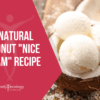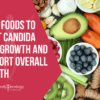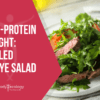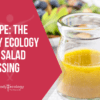The Key to Weight Loss
In a study published this August in Nature, researchers revealed that the inner ecology of those who are overweight is up to 40% less diverse than those who are at a healthy weight. (1)
Less diversity means fewer good bacteria and fewer species of bacteria overall.
Oluf Pederson, professor and scientific director at the Faculty of Health and Medical Sciences at the University of Copenhagen, explains: “Not only [do they have] fewer intestinal bacteria, but they also have reduced bacterial diversity, and they harbor more bacteria, causing a low-grade inflammation of the body.”
To avoid carrying extra weight and in order to be healthy, the gut needs a rich and flourishing inner ecosystem. A limited range of intestinal microbes means that some bad bugs—like Candida—can get the upper hand.
Beneficial gut bacteria help us thrive in life—rather than just survive. For example, good gut bacteria:
- Strengthen the immune system
- Produce essential vitamins, like vitamin K2 and B vitamins
- Communicate with the nervous system and the hormonal system
- Produce a wide range of bioactive chemicals—like neurotransmitters—that enter the bloodstream and affect your biology
Can Gut Bacteria Predict the Risk of Disease?

One essential key to healthy weight loss starts by replenishing the gut with good bacteria. Bacterial diversity in the gut can help to decrease cholesterol, fat tissue, and inflammation.
According to researchers, gut diversity can help to predict your risk for diseases that are associated with obesity—like diabetes, heart disease, and cancer.
The diversity of your inner ecosystem may be a valuable biomarker.
In order to assess the inner ecosystem, researchers use genetic analysis. In other words, they collect and identify the genetic code of microbes living in the gut. So far, genetic analysis gives scientists the most accurate picture of the human inner ecosystem.
Low gene diversity—or not enough variety in the gut—is linked to an increase of inflammation in fat tissue. In fact, whether healthy or overweight, those with low gene diversity are more likely to develop chronic disorders, such as diabetes, heart disease, and cancer.
When the body is overloaded with sugar and inflammation, the good bacteria in the gut starve. Bad bacteria take over, and the diverse inner ecosystem of the gut becomes a monoculture dominated by just a few aggressive microbes.
Anti-inflammatory species of bacteria—like Bifidobacterium and Lactobacillus—are associated with rich, highly diverse inner ecosystems.
The bottom line: Your inner ecology predicts your waistline and your metabolic health.
Foods That Rebuild Your Inner Ecosystem
Chronic weight gain is considered to be one of the most dire health problems of the 21st Century. In 2013, the American Medical Association classified obesity as a disease, which has doubled in the last 30 years.
In a second study, researchers monitored the inner ecosystem of 49 volunteers as they tried to lose weight. Their diet was high in fiber from the plant kingdom, such as fruits and vegetables. (2)
According to researchers, a high-fiber diet may change the bacterial makeup of the inner ecosystem—making it more diverse.
The increase in diversity was associated with a decrease in fat tissue, cholesterol, and inflammation. Jeffrey Cirillo, a professor at Texas A&M Health Science Center’s department of microbial pathogenesis and immunology, explains that these studies “suggest that management of our own diets can improve the richness of the flora within our guts and decrease our chances of becoming obese.”
Restore Your Inner Ecosystem, Lose Weight, and Feel Great!
Long-term dietary habits dramatically shift the health of the gut—and the entire body.
Meals rich in plant fiber act as a prebiotic in the gut, feeding the good bacteria that live there. Sour fruits, starchy and non-starchy vegetables, legumes, and grain-like seeds can encourage the growth of anti-inflammatory bacteria. (3) These foods can even change the entire inner ecology of the gut, making it more diverse.
Probiotic foods, like fermented vegetables and probiotic beverages, within the Body Ecology Diet—an 80% plant-based diet that avoids pro-inflammatory foods like sugar, gluten, and casein—aid in weight loss by balancing your inner ecosystem.
What To Remember Most About This Article:
Overweight individuals may have a 40% less diverse inner ecology compared to those at a healthy weight. Less bacterial diversity in your gut indicates fewer good bacteria needed to improve overall health.
You can make weight loss easy on yourself by supporting your inner ecosystem first of all. Friendly gut bacteria will aid in natural weight loss and will also strengthen your immune system, produce essential vitamins, and communicate with your nervous system. A lack of gut diversity can also increase your risk of disease— regardless of your weight.
Chronic weight gain is a serious health concern that can be remedied by making changes to your diet, starting with the principles of the Body Ecology Diet. Enjoying fermented vegetables and probiotic beverages will rebuild your inner ecosystem with good bacteria and support weight loss as an added bonus!
- [product id=”1″]
- [product id=”169″]
- [product id=”22″]
REFERENCES:
- Le Chatelier, E., Nielsen, T., Qin, J., Prifti, E., Hildebrand, F., Falony, G., … & Pedersen, O. (2013). Richness of human gut microbiome correlates with metabolic markers. Nature, 500(7464), 541-546.
- Cotillard, A., Kennedy, S. P., Kong, L. C., Prifti, E., Pons, N., Le Chatelier, E., … & Ehrlich, S. D. (2013). Dietary intervention impact on gut microbial gene richness. Nature, 500(7464), 585-588.
- De Filippo, C., Cavalieri, D., Di Paola, M., Ramazzotti, M., Poullet, J. B., Massart, S., … & Lionetti, P. (2010). Impact of diet in shaping gut microbiota revealed by a comparative study in children from Europe and rural Africa. Proceedings of the National Academy of Sciences, 107(33), 14691-14696.








